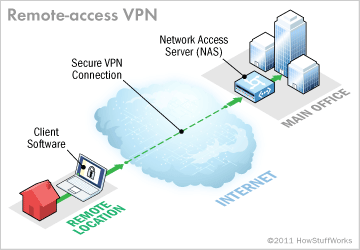A remote-access VPN allows individual users to establish secure connections with a remote computer network. Those users can access the secure resources on that network as if they were directly plugged in to the network's servers. An example of a company that needs a remote-access VPN is a large firm with hundreds of salespeople in the field. Another name for this type of VPN isvirtual private dial-up network (VPDN), acknowledging that in its earliest form, a remote-access VPN required dialing in to a server using an analog telephone system.
There are two components required in a remote-access VPN. The first is anetwork access server (NAS, usually pronounced "nazz" conversationally), also called a media gateway or a remote-access server (RAS). (Note: IT professionals also use NAS to mean network-attached storage.) A NAS might be a dedicated server, or it might be one of multiple software applications running on a shared server. It's a NAS that a user connects to from the Internet in order to use a VPN. The NAS requires that user to provide valid credentials to sign in to the VPN. To authenticate the user's credentials, the NAS uses either its own authentication process or a separate authentication server running on the network.
The other required component of remote-access VPNs is client software. In other words, employees who want to use the VPN from their computers require software on those computers that can establish and maintain a connection to the VPN. Most operating systems today have built-in software that can connect to remote-access VPNs, though some VPNs might require users to install a specific application instead. The client software sets up the tunneled connection to a NAS, which the user indicates by its Internet address. The software also manages the encryption required to keep the connection secure. You can read more about tunneling and encryption later in this article.
Large corporations or businesses with knowledgeable IT staff typically purchase, deploy and maintain their own remote-access VPNs. Businesses can also choose to outsource their remote-access VPN services through an enterprise service provider (ESP). The ESP sets up a NAS for the business and keeps that NAS running smoothly.
A remote-access VPN is great for individual employees, but what about entire branch offices with dozens or even hundreds of employees? Next, we'll look at another type of VPN used to keep businesses connected LAN-to-LAN.



